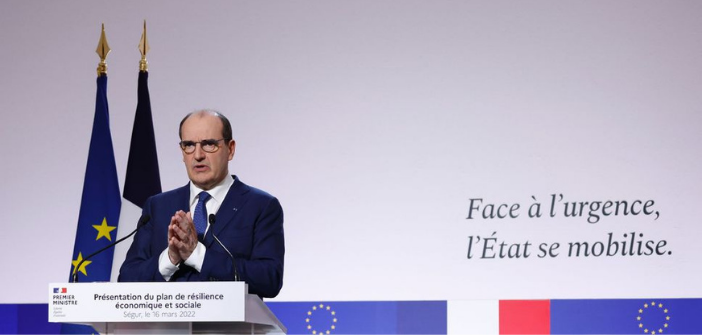This plan is “evolving,” warned Jean Castex, as it must adapt to the Ukrainian situation.
The government will cover part of the extra costs for some companies
The government will assist energy-intensive companies to offset the additional costs caused by the surge in prices following the outbreak of war in Ukraine, announced the Prime Minister. This aid is aimed at companies whose gas and electricity expenses represent “at least 3% of their turnover, and who may incur losses in 2022.” It will allow for “coverage of half of the surplus of their energy expenses,” detailed the head of the government.
Energy expenses represent significant costs, particularly for steel, chemical industries, and certain agricultural activities, which have been requesting help in the face of rising oil, gas, and electricity prices.
The 15-cents-per-fuel-liter assistance is extended to natural vehicle gas and LPG
The 15-cent-per-liter fuel discount granted by the government starting in April for four months will also be extended to natural vehicle gas (GNV) and liquefied petroleum gas (LPG).
The fuel discount “will concern all French people, in metropolitan territory and overseas, both individuals and all professionals,” specified Jean Castex. “The measure will notably benefit truck drivers, taxi drivers, and medical transporters, farmers, public works actors, and fishermen, but also all professions that frequently use their vehicle, such as home aides,” continued the Prime Minister.
He, who had called on Sunday for the “oil companies” to make a “complementary gesture,” also noted that the TotalEnergies group had “already agreed in principle to go beyond the government’s effort.”
Fishermen and farmers will be aided by the government
Jean Castex made “maintaining fishing activities” “an absolute priority.” Fishermen will thus receive an “exceptional financial aid” to help them cope with the surge in energy prices “equivalent to 35 cents per liter of fishing diesel” until the end of July, announced the Prime Minister. The goal? “To get the boats back to sea as quickly as possible.” This measure complements the exceptional six million euros package allocated to fishermen, announced Wednesday by the fishing industry.
The government will also allocate a 400-million-euro package to support livestock breeders facing the rising costs of animal feed. French producers are indeed worried about running out of fertilizers and animal feed, as Russia and Ukraine are significant suppliers. The losses of breeders will be compensated for four months, specified Jean Castex. “A 25% advance on the reimbursement of the TICPE on non-road diesel” will also be given to them “in the coming weeks.”
Energy independence, renewable energies… Long-term measures
The Prime Minister concluded his speech by emphasizing the longer-term measures that will need to be taken to “accelerate the exit from fossil fuels and strengthen France’s industrial and food sovereignty.” The government has thus set the “goal to phase out Russian oil by 2027.” The import capacity of liquefied natural gas will need to be reinforced, as well as capacities in renewable energies and biogas, he asserts. The head of the government promised “an increase in aid to decarbonize heat networks.” The Minister of the Economy, Bruno Le Maire, specified that the government would subsidize companies to reduce dependency on Russian raw materials.
Public services encouraged to lower heating
Jean Castex “will sign in the coming days a circular calling on all public services to reduce heating temperature by one degree to save energy and reduce bills,” specified the Minister of Ecological Transition, Barbara Pompili.


